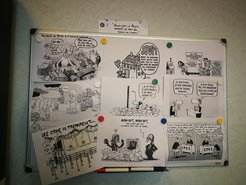The judicialization of human dignity. Irregular migrants, welfare bureaucracies and the courts in French-speaking Belgium
In Belgium, depending on their immigration status, foreigners are entitled to different forms of social assistance, ranging from emergency medical care to financial benefits. In a context where residence permits are constantly updated, re-examined or withdrawn by the administration, this project explores the ways in which welfare bureaucracies and labour courts – which are the relevant jurisdiction – deal with requests from irregular(ized) migrants.
In large cities, welfare bureaucracies and courts are indeed increasingly confronted with users with a precarious immigration status (Goldring & al. 2009), ranging from undocumented third country nationals, to European citizens with or without a registered residence on Belgian soil (Lafleur & Mescoli 2018), or people whose immigration claim is still pending or has been rejected, yet are considered impossible to deport (De Genova 2002) for a variety of reasons.
Based on a 12 months long ethnographic fieldwork within labour courts, welfare administrations and legal aid offices, this project examines irregular migrants’ itineraries within and against welfare administrations, the daily practices of social workers, their interactions with beneficiaries, lawyers and the judiciary, and the way judges decide on social assistance cases, in order to analyse how human dignity is performed on a daily basis for those without a regular immigration status. This research therefore delves into the dynamic interactions between immigration proceedings, welfare administrative practices and labour courts in French-speaking Belgium, looking at three interconnected dimensions: litigant’s itineraries, their understanding of law and expectations towards the state; administrative practices; and judicial discretion in welfare courts.



Local welfare administration, welfare court, social workers’ desk (Photos by S. Andreetta, 2019)
Looking at these different aspects, and at the practices and strategies the various actors involved in the construction of a case, will contribute to better understanding the judicialization of politics – the idea that policy questions are increasingly solved through litigation (Shapiro & Sweets 2002, Hirschl 2011) – at the street-level, or in this case, the judicialization of social assistance, and its social and political effects, by exploring how political questions are dealt with by the judiciary and what the consequences are on administrative practices and on users’ access to public services.
This project finally argues for the need to unpack the social and political effects that judicial decisions have on everyday functioning of public administrations – and on the way (welfare) policies are implemented.


